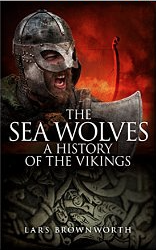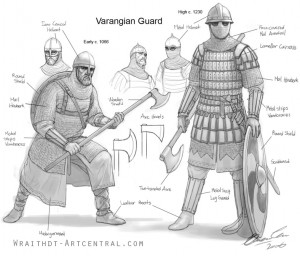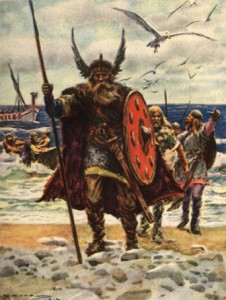 Sean asks which of the Vikings was most interesting and why.
Sean asks which of the Vikings was most interesting and why.
This is one of those ‘moving target’ questions that will have a different answer each time it’s asked. I’ll arbitrarily limit myself three (or else we’ll be here all day).
Part of the fun of writing a book is meeting characters who are radically different than anyone you’re likely to meet here in the 21st century. And the first character who really leapt off the page for me was the much romanticized – but little known – Ragnar Lothbrok. From the dubious legends (inventing a pair of pants that protected him from snake bites, meeting his gorgeous wife Aslaug who proved his equal in cunning, and his death at the hands of a furious English King) to his much chronicled sack of Paris, this was a man who fully lived out the Viking creed that man may be mortal, but reputations live forever.
The second figure has to be Aud the Deep-Minded. She was the wife of the Viking king of Dublin, who was widowed at a relatively young age. Rather than marry again, she took her son to the Hebrides and helped him conquer half of Scotland. When he too was killed, the redoubtable Aud sailed to Iceland – commanding a crew of twenty Vikings – and claimed a large plot of land. In an age dominated by men, Aud ruled as a clan chief, settling disputes, granting favors, and throwing celebrated feasts. When she died two decades later she was given a full Viking Ship funeral, the only recorded woman ever to be honored with one.
Finally, I have to include the terrible Harald Hårdrada. No single figure better represents the entire Viking Age. He was probably pagan, but was the half brother of Norway’s patron saint. He spent time raiding in France, but made his reputation – and a tremendous amount of money – in the east by protecting Byzantine Emperors in the celebrated Varangian Guard. After proving both his cunning and valor on the battlefield, he returned home and seized the throne of Norway, but true to his restless spirit, he spent most of his time trying to conquer additional territory. His story concluded fittingly with a bloody invasion of England. He died – as all Vikings should – with his armor on, and his battle axe swinging.
Hollywood really has nothing on this.
 Listener William asked who the Varangians were and why they figured so prominently in Byzantine military affairs.
Listener William asked who the Varangians were and why they figured so prominently in Byzantine military affairs.
The Varangians were the elite forces of the Byzantine army- much like the Praetorian Guard of ancient Rome or the Ottoman Janissaries. They were originally made up exclusively of Vikings (which the empire had been hiring as mercenaries since the 9th century), but after the Norman Conquest of England a rush of exiled Anglo-Saxons were added to the mix. By the 12th century there were so many English that it was commonly being referred to as the ‘Anglo-Varangian’ Guard. As the empire declined, the Varangians also fell on hard times. By the middle of the 14th century they had largely ceased to function and the last mention of them is in the first decade of the 15th century.
They appeared relatively late in Byzantine history. In 988, the emperor Basil II, facing a serious revolt, asked the Viking prince of Kiev for some help. In exchange for an imperial bride, the prince sent along 6,000 warriors and Basil was so pleased by their effectiveness that he made them his permanent bodyguard. Their oaths were to him personally- a fact that the court was uncomfortably aware of- and they were housed in the Bucoleon Palace where they could keep an eye on things. Basil made sure they were given a generous salary and he called them ‘Varangians’- literally ‘men of the pledge’.
Since they were professional fighters they were the most valuable troops in an army made up mostly of mercenaries or levies. Usually taller and fiercer than their Mediterranean hosts/opponents, they also made good use as propaganda tools to overawe rebellious subjects or frighten opposing armies. In times of peace they could act as a police force in Constantinople or for ceremonial functions. In war they were usually held in reserve until the critical phase of the battle- then sent where the fighting was thickest. Even the Byzantines seem to have been slightly terrified of their berserker rages.
The opportunities for wealth ensured a steady stream of recruits, and few returned home empty-handed. At the death of an emperor they had the curious right to raid the treasury and take away whatever they could carry unassisted. Perhaps because of this they gained a reputation for fierce loyalty to the office- but not necessarily the occupant- of the throne.
At times the temptations of power were too much to resist and they would lord it over the population of Constantinople- usually in the local wine shops. Their drinking bouts were almost as legendary as their fighting skills and a visiting Danish king in the 11th century was embarrassed enough to publicly lecture them about their behavior.
His words do not appear to have had the desired effect. A century later some brave soul referred to the Varangians as the ‘Emperor’s wine-bags’.

Listener Shane asked if William the Conqueror and Harald Hardrada had an agreement to attack England jointly. This could after all explain certain curious behaviors by both William and Harald. The Duke delayed his departure to England claiming a lack of favorable winds- was he instead waiting for Hardrada’s attack to draw away King Harold’s forces? Along the same vein, did the Norse invader lower his defenses after Stamford Bridge because he was expecting Harold to be tied up at Hastings? The Normans and Vikings had deep ties and a shared cultural background and it isn’t beyond the realm of possibility that they would act together.
It’s an intriguing idea, but ultimately, I think unlikely. While the close timing of the invasions was certainly mutually beneficial and Hardrada almost certainly knew of William’s plans (he hardly bothered to keep them secret), neither man’s personality was given to sharing. William genuinely believed that he had the best right to the entire kingdom, and while his delay in crossing the Channel proved fortuitous it would be giving him too much credit to say that it was a calculated strategy. Every day that passed with his army still in Normandy cost him in money, food and reputation, and he was as anxious as Harold to resolve the situation as quickly as possible. The more opportunistic Hardrada may indeed have taken advantage of William’s threat, but he was no more likely to share authority than his Norman opponent. He had just finished a fifteen-year war with the legitimate king of Sweden, fought for no other reason than a blatant power grab. This was a man who clearly didn’t tolerate rivals.
If indeed there was an agreement- something like the partition of England that Cnut and Edmund Ironside had concluded a generation earlier- it’s interesting to speculate what would have happened. It would clearly have been a partnership headed for disaster, as neither man would have trusted the other an inch. Only a matter of time and they would be at each other’s throats.
 Listener Eric asked if there was any truth to the medieval rumor that the legendary Hrolfr Granger- a man so enormous that no horse could support his weight- was actually Rollo of Normandy.
Listener Eric asked if there was any truth to the medieval rumor that the legendary Hrolfr Granger- a man so enormous that no horse could support his weight- was actually Rollo of Normandy.
Believe it or not this was a question of such fierce debate in the early 20th century that it spilled into national newspapers and became the subject of several angry diatribes. 1911 was the 1,000th year anniversary of the founding of Normandy and there was much Scandinavian pride in this native son made good. The trouble was that no one was exactly sure where Rollo came from and both Denmark and Norway claimed him. Norway especially was proud of its distinct national character (they had just broken away from Sweden in 1905) and wasn’t about to let Denmark steal their thunder.
What made the argument particularly fierce is that there is so little reliable information about Rollo’s origins. The earliest source (Richer of Reims- circa 996) gives Rollo a Danish origin, but he makes no distinction between any Vikings, referring to all of them as Danes. Where exactly each roving band of raiders originated was not that important to those who had to fend them off. The Norse sagas on the other hand (circa 12th century) all claim that Rollo (whom they call Hrolfr Granger) was from Norway as does the French Chronicon de gestis Normannorum and the Welsh Historia Gruffud vab Kenan. The Normans themselves were split on the subject. Dudo of St. Quentin (1030) gave Rollo a Danish father while Geoffrey Malaterra (1090) gave him a Norwegian one.
The truth unfortunately is that we will probably never have conclusive proof either way. I tend to think that the Norse account of Hrolfr Granger contains a healthy dose of legend but that it can loosely be connected to Rollo. The medieval sources, when they bothered to distinguish between different groups of Vikings, usually came down on the side of a Norwegian ancestry. Hardly an airtight case, but most likely the best we can do.
 Listener Bruce from Ohio asked about the background of the Normans. Can they really be considered Vikings? The answer- as is so often the case with history- is yes and no. The Normans were indeed descended from Scandinavian stock and the term ‘Norman’ comes from ‘northmen’ which was the French term for the Vikings. Rollo the first “Duke” led a collection of Norwegian and Danish raiders who forced the Frankish king Charles the Simple to grant them land. These Vikings, however, were always a minority in Normandy, surrounded and vastly outnumbered by the French population. Rollo, who knew he had to adapt to survive, set the tone by taking a Frankish wife, adopting the French language and religion, and encouraging his men to do likewise. Within a generation Norse names died out, and the Dukes were busy trying to prove that they were respectable members of the Frankish power structure. They maintained close ties with their Scandinavian cousins- even agreeing to sell Viking plunder in their markets- but made it a point to distinguish themselves from the ‘sea wolves’.
Listener Bruce from Ohio asked about the background of the Normans. Can they really be considered Vikings? The answer- as is so often the case with history- is yes and no. The Normans were indeed descended from Scandinavian stock and the term ‘Norman’ comes from ‘northmen’ which was the French term for the Vikings. Rollo the first “Duke” led a collection of Norwegian and Danish raiders who forced the Frankish king Charles the Simple to grant them land. These Vikings, however, were always a minority in Normandy, surrounded and vastly outnumbered by the French population. Rollo, who knew he had to adapt to survive, set the tone by taking a Frankish wife, adopting the French language and religion, and encouraging his men to do likewise. Within a generation Norse names died out, and the Dukes were busy trying to prove that they were respectable members of the Frankish power structure. They maintained close ties with their Scandinavian cousins- even agreeing to sell Viking plunder in their markets- but made it a point to distinguish themselves from the ‘sea wolves’.
So what exactly were they? As frustrating as it is we have to fall back on how they saw themselves. Their court historians never tired of pointing it out. They were not Vikings or French but something far better. They were Normans.
 Sean asks which of the Vikings was most interesting and why.
Sean asks which of the Vikings was most interesting and why.


